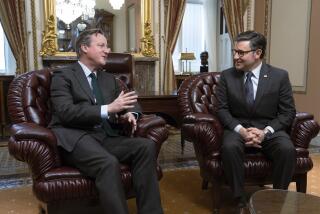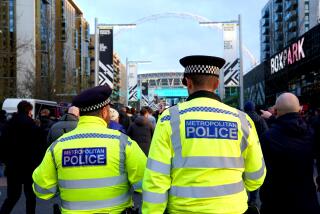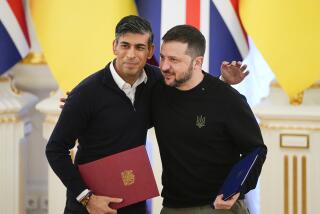Britain raises terrorism threat in response to Islamic State
Britain raised its terror threat level to “severe” on Friday, meaning that officials consider an attack on the country is “highly likely” -- an assessment based on the growing influence of the Islamic State in Iraq and Syria.
At a news conference in London, British Prime Minister David Cameron said the Islamic State poses a “greater and deeper threat to our security than we have known before.”
However, though the country lifted its threat level one notch from “substantial” to “severe,” the second-highest category, Home Secretary Theresa May stressed that “there is no intelligence to suggest that an attack is imminent.”
It was the first time in three years that Britain has been at such a heightened security level.
The move comes as international attention has focused on the Islamic State, an Al Qaeda splinter group, after it beheaded American journalist James Foley. In an online video of the killing, the executioner speaks with a British accent.
Cameron said Britons were “shocked and sickened” by idea that Foley may have been killed by someone who is British.
“It was clear evidence ... that this is not some foreign conflict thousands of miles from home that we can hope to ignore,” the prime minister said. “The ambition to create an extremist caliphate in the heart of Iraq and Syria is a threat to our own security here in the U.K.”
May, similarly, said the increase in threat level “is related to developments in Syria and Iraq, where terrorist groups are planning attacks against the West. Some of those plots are likely to involve foreign fighters who have traveled there from the U.K. and Europe to take part in the conflict.”
It’s estimated that approximately 500 Britons have traveled to fight in the region. About 200 are believed to have already returned home, and concern is growing in Britain about a potential influx of fighters flowing back into the country.
To combat that threat, Cameron announced plans for legislation that will allow Britain to strip suspected terrorists of their passports. He promised more details would be presented to Parliament on Monday.
“We need to do more to stop people traveling, to stop those who do go from returning, and to deal decisively with those who are already here,” the prime minister said.
The decision to raise the threat level was taken by Britain’s Joint Terrorism Analysis Center, an independent body in charge of assessing terrorist threats.
Raffaello Pantucci, a counter-terrorism expert at Britain’s Royal United Services Institute, said the move is quite significant. “The government doesn’t raise the threat level ... unless there’s a very real concern,” he said.
He said that when the threat level has been raised in the past, the move has typically linked to intelligence of a specific terror plot. In this instance, he said, there’s concern over how the Islamic State might react to U.S. bombing of the group’s forces in Iraq.
British security officials promised increased patrols and tighter security measures, although Cameron urged Britons to go about their lives as normal.
Officials at Heathrow Airport, Britain’s largest travel hub, did not respond to questions about increased security. Passengers at the airport reported no disruptions.
In a statement Friday, U.S. Secretary of Homeland Security Jeh Johnson acknowledged Britain’s new terror threat level, while adding that American authorities were “unaware of any specific, credible threat to the U.S. homeland from ISIL,” an acronym commonly used for the Islamic State.
Johnson said the United States, along with Britain and other countries, has taken action in recent weeks “to enhance aviation security at overseas airports.”
“This government, in close collaboration with our international partners, has also taken a series of steps to track foreign fighters who travel in and out of Syria, and we are contemplating additional security measures concerning foreign fighters,” Johnson said. “Some of the security measures will be visible to the public and some understandably will be unseen.”
Werth is a special correspondent. Times staff writer Christine Mai-Duc in Los Angeles contributed to this report.
More to Read
Start your day right
Sign up for Essential California for news, features and recommendations from the L.A. Times and beyond in your inbox six days a week.
You may occasionally receive promotional content from the Los Angeles Times.






